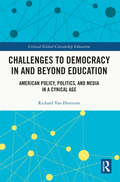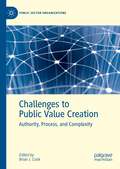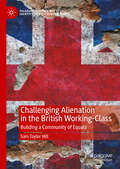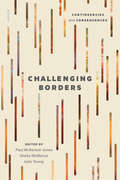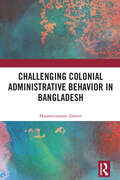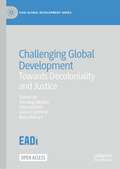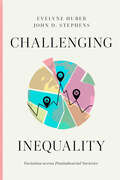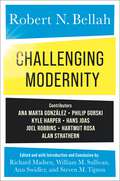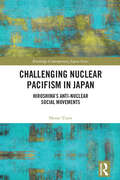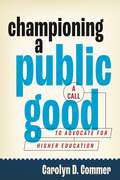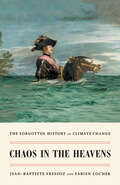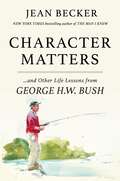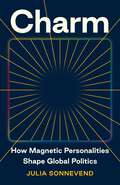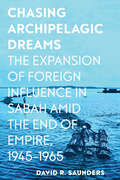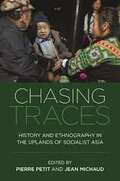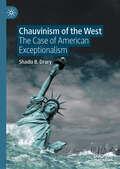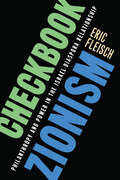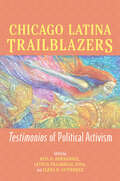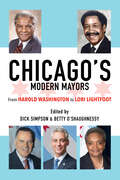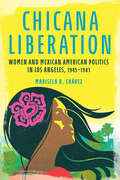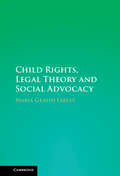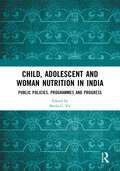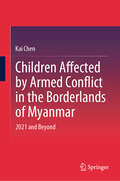- Table View
- List View
Challenges to Democracy In and Beyond Education: American Policy, Politics, and Media in a Cynical Age (Critical Global Citizenship Education)
by Richard Van HeertumThis book explores political cynicism as a driving force at the heart of the current crisis of democracy in the United States, focusing on the crisis and the role of education, popular culture and news media in fostering and fighting cynicism. In this unique text, Van Heertum draws on historical and contemporary data, policy, and current events to map the growth of a cynicism that risks undermining the democratic principles upon which American society is built. Tracing the philosophical, social and historical origins of an “ubiquitous cynicism” cultivated in political discourse, media and educational policy, the chapters then explore avenues to challenge cynicism and restore hope through a more affirmative discourse, aesthetic education, media and educational reform, challenging rampant inequality, and methods to rein in corporate power. The book ultimately advocates for a radical democracy that can restore the power of the people to have a meaningful say in the decisions that affect their lives. A timely and useful contribution to the field of education, this book will be of interest to postgraduate students and researchers in the fields of educational policy and politics, the sociology of education and American studies.
Challenges to Public Value Creation: Authority, Process, and Complexity (Public Sector Organizations)
by Brian J. CookThis volume examines fundamental questions about the public value of public decisions. More specifically, it seeks to assess whether all public decisions create public value, if it is possible to know what value for the public as a whole a government decision will create, and how government officials can justify their decisions in terms of public value. Leading experts bring a diverse array of perspectives on the normative, epistemological, and processual challenges to identifying, describing, measuring, and evaluating the public value claims that public officials often articulate in defending their decisions, and the results that citizens often seek. The book will appeal to scholars and students of public policy and public administration.
Challenging Alienation in the British Working-Class: Building a Community of Equals (Palgrave Politics of Identity and Citizenship Series)
by Sam Taylor HillThis book explores the possibility of alienation amongst the British working-class and argues that the class is, in fact, alienated. Its point of departure is the right-communitarians, who outline how the working class has become alienated as a result of a loss of its political agency, the breakdown of its communities, and the undermining of its dignity. However, where these scholars tend to propose solutions from a right-communitarian perspective, this book adopts a more inclusive, left-wing, position to address working-class concerns.
Challenging Borders: Contingencies and Consequences
by Julie Young Paul McKenzie-Jones Sheila McManusBorders are known for their paradoxical qualities. Sometimes they are shifting and porous, lines in the sand constituted more by subjective experience than by legal definition; at other times they harden into walls, are heavily securitized, and their primary function becomes keeping the unwanted out. Challenging Borders: Contingencies and Consequences sets out to explore the concrete, complex effects of borders on human aspirations and lives, while at the same time underscoring the diversity of individual encounters with these deceptively invisible lines.Drawing on insights from history, geography, Indigenous studies, political science, refugee and migration studies, the visual arts, and even physics, contributors to the collection examine the role of borders in the ongoing negotiation of national identities, in contested claims of sovereignty and belonging, in the tensions between freedom of movement and restrictions on entry, and in the use of violence in the name of security. As the essays illustrate, in the context of migration, borders are inherently a site of struggle—at once a source of hope for those seeking sanctuary and an excuse for others to deny it. Indigenous nations, migrants, and refugees have long known how destructive colonial boundaries can be, and this volume offers compelling new angles from which to map the geographies of oppression and resistance.
Challenging Colonial Administrative Behavior in Bangladesh
by Hasanuzzaman ZamanThis book studies public policy and administration in Bangladesh. It studies how, despite recording high-levels of corruption persistently, some governments in least developed countries (LDCs) like Bangladesh have achieved impressive online transformation level, through digital, electronic or e-Government implementation. The book investigates the historical and political context, and examines the different policies and strategies adopted by successive governments of Bangladesh for facilitating digital service delivery transformation of traditional, paper-based, circuitous public service delivery processes. It reviews public administration reforms introduced over several decades, and other initiatives launched with the specific objective of improving service delivery management. The volume also contextualizes the new e-Government development initiatives in light of the various approaches such as traditional public administration, new public management, digital era governance, new public governance, and design thinking. Drawing on a host of published and unpublished materials, interviews with senior public officials, academics, representatives of international donor agencies, think tanks and non-governmental organizations, and a survey of more than 400 plus bureaucrats, the book analyzes the progress of digital government in Bangladesh from a soft, behavioral perspective. It will be of great interest to scholars and researchers of public policy and public administration, politics, innovation, and South Asian studies. It will be an essential reading for bureaucrats and government officials, as well as think tanks and NGOs.
Challenging Global Development: Towards Decoloniality and Justice (EADI Global Development Series)
by Henning Melber Laura Camfield Uma Kothari Kees BiekartThis open access book presents contributions to decolonize development studies. It seeks to promote and sustain new forms of solidarity and conviviality that work towards achieving social justice.Recognising global poverty and inequalities as historic injustices, the book addresses how these can be challenged through teaching, research, and engagement in policy and practice, and the sorts of political barriers these might encounter. From a variety of perspectives and contexts, these chapters examine how decoloniality and solidarity can be developed, offering in-depth historical, theoretical, epistemological, and empirical analyses.
Challenging Inequality: Variation across Postindustrial Societies
by Evelyne Huber John D. StephensA wide-ranging examination of how policies, parties, and labor strength affect inequality in post-industrial societies. Not all countries are unequal in the same ways or to the same degree. In Challenging Inequality, Evelyne Huber and John D. Stephens analyze different patterns of increasing income inequality in post-industrial societies since the 1980s, assessing the policies and social structures best able to mitigate against the worst effects of market inequality. Combining statistical data analysis from twenty-two countries with a comparative historical analysis of Germany, Spain, Sweden, and the United States, Huber and Stephens identify the factors that drive increases in inequality and shape persistent, marked differences between countries. Their statistical analysis confirms generalizable patterns and in-depth country studies help to further elucidate the processes at work. Challenging Inequality shows how the combination of globalization and skill-biased technological change has led to both labor market dualization and rising unemployment levels, which in turn have had important effects on inequality and poverty. Labor strength—at both the society level and the enterprise level—has helped to counter rising market income inequality, as has a history of strong human capital spending. The generosity of the welfare state remains the most important factor shaping redistribution, while the consistent power of left parties is the common denominator behind both welfare state generosity and human capital investment.
Challenging Modernity
by Robert N. BellahFrom the 1960s until his death in 2013, Robert N. Bellah was the preeminent figure in the study of religion and society. He broke new ground in mapping the religious dimensions of human experience, from the great breakthroughs of the first millennium BCE to the paradoxes of American civic life. In three final essays, published here for the first time, Bellah grapples with the contradictions of modernity, and seven leading thinkers respond with profound, exhilarating new perspectives on our present predicament.Challenging Modernity critically assesses the modern project to shed light on the tensions between its transcendent aspirations and the perils we now face. Its contributors analyze the roots of the collapse of the political, economic, and cultural institutions that promised perpetual progress but now threaten global catastrophe. Reflecting the range of Bellah’s scholarship, they span the disciplines of history, sociology, anthropology, and philosophy. They extend Bellah’s insight that only deep historical, cultural, and religious understanding can help us meet modernity’s harrowing challenges by sharing responsibility for the global interdependence of our common fate.
Challenging Nuclear Pacifism in Japan: Hiroshima's Anti-nuclear Social Movements (Routledge Contemporary Japan Series)
by Masae YuasaIs Japan abandoning its pacifism? The Japanese government has claimed it is doubling its defense spending and has announced a plan to equip itself with the capability to “counterattack” enemy bases overseas, a departure from the nation’s postwar consensus. Shedding new light on Japan’s pacifism and Hiroshima’s role in it, Yuasa investigates the events of postwar Japan and how it catalyzed a range of challenges to public sentiment. Japan’s Constitution stipulates the renunciation of war and forbids using force to settle international disputes. This radical shift has been led by Fumio Kishida, the prime minister, whose constituency is Hiroshima, the atomic-bombed city symbolizing Japan’s postwar pacifism. This book is about Hiroshima’s local nuclear politics and popular consciousness about pacifism. Based on published and unpublished local documents and participant observation, it describes how postwar global and national power has formulated local politics and discusses the impact of local struggles on national and global politics. The key concept is “imaginary”. Institutionalized imaginary effectively channels people’s suppressed desires and emotions into coordinated action in the society. The current political crossroad of Hiroshima and Japan is interpreted as a terrain constructed over the last half century by three paradoxically coexisting and competing pacifist imaginaries, namely constitutional, anti-nuclear, and nuclear pacifism. They were, however, significantly destabilized by the Fukushima nuclear disaster and a newly invented “proactive pacifism”. This book is an essential reading for scholars and students interested in Japanese postwar history and nuclear issues in general.
Championing a Public Good: A Call to Advocate for Higher Education (Rhetoric and Democratic Deliberation)
by Carolyn D. CommerFrom decreased funding to censorship controversies and rising student debt, the public perception of the value of higher education has become decidedly more negative. This crisis requires advocacy and action by policymakers, educators, and the public. Championing a Public Good presents a clear set of strategies and tools for advocates making the case for renewing our civic commitment to public higher education.Taking a fresh look at one of the most controversial moments in the history of US higher education, the work of the Spellings Commission (2005–2008), Carolyn D. Commer argues that this body’s public criticisms of higher education and its recommendation to increase accountability and oversight—via market-based metrics—accelerated the erosion of the concept of higher education as a public good. Countering that requires a careful, forceful approach on the part of advocates. Commer draws from the public record to demonstrate a common set of arguments, metaphors, and rhetorical frames that can, in fact, flip the public debate over higher education to champion the public value of universities and colleges over their value as market commodities.Championing a Public Good is a powerful primer on how to change the course of public higher education in the United States. It will appeal especially to faculty, administrators, and policymakers in higher education.
Chaos Comes Calling: The Battle Against the Far-Right Takeover of Small-Town America
by Sasha AbramskyA harrowing tale of how polarization threatened to break apart two American communities and how one found a way back while the other splintered. Donald Trump&’s November 2016 electoral victory was the beginning of four years of demagogy, presidential name-calling, and—ten months into a pandemic—an incitement to violence that led a mob of thousands to descend on the Capitol in Washington, DC. Fueled by suspicion, conspiracy, and bigotry, a faction of Americans had decided to seize control. But the biggest effect of this right-wing wave may not have been on our national politics, but on the local governments of communities around the country. In Chaos Comes Calling, Sasha Abramsky investigates the empowerment of the far-right over the past few years, stoked by the Trump presidency and the Covid-19 pandemic. He tells the parallel stories of two communities, Shasta County, California and Sequim, Washington, where toxic alliances of QAnoners, anti-vaxxers, Christian nationalists, militia supporters and other denizens of the far-right have worked to take control of the levers of power. The trajectories of both communities expose the stark divisions and extremism that have come to define our political landscape over the past decade, and offer revealing glimpses of what the future may hold. While Sequim ultimately recalibrated in 2021, returning to rationality, Shasta County has descended further into a climate of intolerance and toxic divisiveness. Chaos Comes Calling vividly captures both the regressive forces gaining momentum all over the country and the tireless efforts of citizens determined to organize against them.
Chaos and the Automaton (e-flux)
by Franco 'Bifo' BerardiFacing real threats of extinction and futurelessness, a search for new ground on which to build projects toward emancipationChaos and the Automaton is the first volume to collect Franco &“Bifo&” Berardi&’s extensive collaboration with e-flux, which has become one of his primary English-language publishers since 2010. The selection of key essays collected here presents Berardi&’s prescient interventions into more than a decade of social turmoil, offering a tour through the cataclysms that have rocked the foundations of the global order since the 2008 financial crisis, from European austerity, Occupy, the Arab Spring, and Anonymous through the ascendance of Pope Francis, Brexit, Covid-19, the Trump–Biden sequence, the U.S. Capitol riots, and the Russian invasion of Ukraine—as well as bizarre new cultural occurrences that were consequences. Berardi draws not only from current events but also movements and figures at the firmament of his thought, such as Guattari, Pasolini, and Italian street art of the 1970s. His essays represent a sustained and singular effort to reveal the psychic and material underpinnings of a society in which history came roaring back at the same moment as any vision of a sustainable future receded from sight. &“I know that it is dangerous to write in simultaneity with events that nobody can precisely foresee, that can only be vaguely intuited,&” he wrote on the eve of the 2020 American elections, &“but the only way to imagine something about the becoming of the psycho-sphere is to run ahead of the dynamics of the disaster.&”
Chaos in the Heavens: The Forgotten History of Climate Change
by Jean-Baptiste Fressoz Fabien Locher"If you want to understand the long path to the climate crisis, read this book." –Deborah Coen, Professor of History and the History of Science and Medicine, Yale UniversityPoliticians and scientists have debated climate change for centuries in times of rapid changeNothing could seem more contemporary than climate change. Yet, in Chaos in the Heavens, Jean-Baptiste Fressoz and Fabien Locher show that we have been thinking about and debating the consequences of our actions upon the environment for centuries. The subject was raised wherever history accelerated: by the Conquistadors in the New World, by the French revolutionaries of 1789, by the scientists and politicians of the nineteenth century, by the European imperialists in Asia and Africa until the Second World War.Climate change was at the heart of fundamental debates about colonisation, God, the state, nature, and capitalism. From these intellectual and political battles emerged key concepts of contemporary environmental science and policy. For a brief interlude, science and industry instilled in us the reassuring illusion of an impassive climate. But, in the age of global warming, we must, once again, confront the chaos in the heavens.
Character Matters: And Other Life Lessons from George H. W. Bush
by Jean BeckerFormer Chief of Staff to President George H.W. Bush and New York Times bestselling author of The Man I Knew, Jean Becker shares touching and pivotal life lessons from a leader that left a mark on people's hearts and souls. As America heads into what promises to be a tumultuous 2024 presidential election year, Character Matters will be a good reminder of the importance of character when defining true leadership. Colleagues, friends, and family will share their often very personal stories of what they learned from watching and listening to President Bush, including former United States Secretary of State Condoleezza Rice; Secretary of State James A. Baker; stand-up comedian Dana Carvey; "Queen of Country" star Reba McEntire; American columnist for The New York Times Maureen Dowd; American novelist Brad Meltzer; presidential biographer Jon Meacham; former Prime Minister of the United Kingdom John Major; former Prime Minister of Canada Brian Mulroney; Secretary of Defense Robert Gates; the Oak Ridge Boys and best-selling author Christopher Buckley; and of course his grandchildren. Character Matters will illustrate how George Bush never stopped showing us the way to lead by example.
Charm: How Magnetic Personalities Shape Global Politics
by Julia SonnevendThe utilization—and weaponization—of charm in contemporary global politicsPolitics is a site of performance, and contemporary politicians often perform the role of a regular person—perhaps someone we would like to have a beer with. They win elections not because of the elevated rhetorical performances we often associate with charisma (&“ask not what your country can do for you&”), but because of something more ordinary and relatable. The everyday magic spell that politicians cast using mass and social media is what sociologist Julia Sonnevend calls &“charm.&” In this engaging and enlightening book, Sonnevend explores charm (and the related &“charm offensive&”) as a keyword of contemporary global politics. Successful political leaders deploy this form of personal magnetism—which relies on proximity to political tribes and manifests across a variety of media platforms—to appear authentic and accessible in their quest for power.Sonnevend examines the mediated self-representations of a set of liberal, illiberal, and authoritarian political leaders, past and present: New Zealand&’s Jacinda Ardern, Hungary&’s Viktor Orbán, Iran&’s Mohammad Javad Zarif, North Korea&’s Kim Jong-un, and Germany&’s Angela Merkel. She considers how charm (or the lack of it) is wielded as a political tool, and the ways charm is weaponized to shape the international image of a country, potentially influencing decisions about military aid, trade, and even tourism. Sonnevend argues that charm will shape the future of democracy worldwide, as political values will be increasingly embodied by mediated personalities. These figures will rise and fall, often fading into irrelevance; but if we do not understand charm&’s political power, we cannot grasp today&’s fragile political moment.
Chasing Archipelagic Dreams: The Expansion of Foreign Influence in Sabah amid the End of Empire, 1945–1965
by David R. SaundersIn Chasing Archipelagic Dreams, David R. Saunders demonstrates that the withdrawal of the British imperial state from Sabah did not result in the decolonization of the territory. From the late 1940s to the 1960s, international anti-colonialism interacted with regional competition over Sabah to result in a paradoxical increase of British power and influence on the ground. Meanwhile, ethnic, social, and political heterogeneity in Sabah contributed to fragmentation and disunity, undermining the development of a local anti-colonial movement. Instead, a class of influential local elites seized power as competing attempts by the Philippines, Indonesia, and Malaya to incorporate the territory into their respective archipelagic spheres grew in strength. Due to these local and international rivalries, Saunders argues, Sabah's eventual merger with the Federation of Malaysia in 1963 prompted an extension of colonial-style rule, resource extraction, the suppression of local autonomy, and the imposition of an externally-configured national identity. Chasing Archipelagic Dreams underscores the significance of regional rivalries in the South China Sea and highlights the fate of subaltern communities bisected by (post)colonial borders.
Chasing Traces: History And Ethnography In The Uplands Of Socialist Asia
by Pierre Petit Jean MichaudIn the connected highlands of southwest China, Vietnam, and Laos, recalling the past is a highly sensitive act. Among local societies, many may actively avoid recalling the past for fear of endangering themselves and others. Oral traditions and rare archives remain the main avenues to visit the past, but the national revolutionary narrative and the language of heritagization have strongly affected the local expression of historical memory. Yet this does not prevent local societies from producing their stories in their own terms, even if often in conflict with both national and Western categories. Producing history, ethnohistory, historical anthropology, and historical geography in the Southeast Asian highlands raises significant questions relating to methodology, epistemology, and ethics, for which most researchers are often ill-prepared. How can scholars manage to competently access information about the past? How is one to capture history-in-the making through events, speech acts, rituals, and performances? How is the memory of the past transmitted—or not—and with what logic? Based on the experiences and reflections of a dozen diverse scholars rooted in decades of work in these three communist states, Chasing Traces is the first book about historical ethnography and related issues in the Southeast Asian highlands. Taking a critically reflexive posture, the authors make a plea for the individual, the hidden, and the backstage, for what life is really like on the ground, as opposed to imagined homogeneity, legibility, and unambiguousness. Their investigations on the history of ethnic minority communities adds archival historiography to ethnographic fieldwork and examines the relationship between the two fields. The individual chapters each tell distinctive stories of the conjunction of fieldwork, archival research, official surveillance, community participation, cultural norms, partnership with local scholars, and the other factors that both facilitate and frustrate the research enterprise of writing about the past in these societies. A timely work, this volume also provides guidelines for alternative ways to document and reflect when physical access becomes limited due to factors such as pandemic, political instability, and violence, and offers creative ways for researchers to cope with these dramatic shifts.
Chauvinism of the West: The Case of American Exceptionalism
by Shadia B. DruryThis book is a critical exploration of the intellectual foundations of American foreign policy on the left and the right. The left is inspired by Immanuel Kant’s idea that spreading democracy is the key to universal peace. The right is inspired by the realism of Thucydides, Leo Strauss, and Carl Schmitt. The emphasis is on military power as a sign of superiority and a means to survival. For the right, spreading democracy is merely a ploy for building a global commercial empire to rival the British. Drury gives reasons for rejecting both as manifestations of the chauvinism of the West.
Checkbook Zionism: Philanthropy and Power in the Israel-Diaspora Relationship
by Eric FleischAmerican Jews donate approximately $2.5 billion to Israel each year. Behind all that money and influence lies a power-sharing dynamic that has left an indelible mark on the relationship between Israeli and American Jews and on the direction of Israeli society to this day. Checkbook Zionism investigates how both parties have managed their interests, emotions, and attitudes about the important yet at times tense collaboration between them. By delving into the history of American Jews’ philanthropic giving to Israelis, Fleisch assesses the core nature of power sharing between both sides of the Jewish diaspora to the United States through in-depth contemporary case studies of the relationship between sixteen non-governmental organizations and their American Jewish donors. Field observation, document analysis, and interviews with leaders, activists, and select donors alike serve a critical role here, as Fleisch assesses whether these contemporary philanthropic associations repeat classic dynamics of power-sharing or whether they represent a marked departure from the Checkbook Zionism of old. The result is a new paradigm for evaluating power sharing that can be applied to future considerations of development in the Israel-Diaspora relationship.
Chicago Latina Trailblazers: Testimonios of Political Activism (Latinos in Chicago and Midwest)
by Ana Castillo Maria B Cerda Carmen Chico Aracelis Flecha Figueroa Aida Luz Giachello Mary Gonzales Ada Nivia López Emma Lozano Virginia Martinez Carmen Mendoza Elena Mulcahy Guadalupe Reyes Luz Maria Solis Carmen VelasquezMexican American and Puerto Rican women have long taken up the challenge to improve the lives of Chicagoans in the city’s Latino/a/x communities. Rita D. Hernández, Leticia Villarreal Sosa, and Elena R. Gutiérrez present testimonies by Latina leaders who blazed new trails and shaped Latina Chicago history from the 1960s through today. Taking a do-it-all attitude, these women advanced agendas, built institutions, forged alliances, and created essential resources that Latino/a/x communities lacked. Time and again, they found themselves the first Latina to hold their post or part of the first Latino/a/x institution of its kind. Just as often, early grassroots efforts to address issues affecting themselves, their families, and their neighborhoods grew into larger endeavors. Their experiences ranged from public schools to healthcare to politics to broadcast media, and each woman’s story shows how her work changed countless lives and still reverberates across the entire city. An eyewitness view of an unknown history, Chicago Latina Trailblazers reveals the vision and passion that fueled a group of women in the vanguard of reform. Contributors: Ana Castillo, Maria B. Cerda, Carmen Chico, Aracelis Flecha Figueroa, Aida Luz Maisonet Giachello, Mary Gonzales, Ada Nivia López, Emma Lozano, Virginia Martinez, Carmen Mendoza, Elena Mulcahy, Guadalupe Reyes, Luz Maria B. Solis, and Carmen Velasquez
Chicago’s Modern Mayors: From Harold Washington to Lori Lightfoot
by Kari Lydersen Dick Simpson Costas Spirou Dennis Judd Daniel Bliss Betty O'Shaughnessy Xolela Mangeu Gregory D Squires Monroe Anderson Marco Rosaire Rossi Clinton StockwellPolitical profiles of five mayors and their lasting impact on the city Chicago’s transformation into a global city began at City Hall. Dick Simpson and Betty O’Shaughnessy edit in-depth analyses of the five mayors that guided the city through this transition beginning with Harold Washington’s 1983 election: Washington, Eugene Sawyer, Richard M. Daley, Rahm Emmanuel, and Lori Lightfoot. Though the respected political science, sociologist, and journalist contributors approach their subjects from distinct perspectives, each essay addresses three essential issues: how and why each mayor won the office; whether the City Council of their time acted as a rubber stamp or independent body; and the ways the unique qualities of each mayor’s administration and accomplishments influenced their legacy. Filled with expert analysis and valuable insights, Chicago’s Modern Mayors illuminates a time of transition and change and considers the politicians who--for better and worse--shaped the Chicago of today.
Chicana Liberation: Women and Mexican American Politics in Los Angeles, 1945-1981 (Women, Gender, and Sexuality in American History)
by Marisela R. ChávezMexican American women reached across generations to develop a bridging activism that drew on different methods and ideologies to pursue their goals. Marisela R. Chávez uses a wealth of untapped oral histories to reveal the diverse ways activist Mexican American women in Los Angeles claimed their own voices and space while seeking to leverage power. Chávez tells the stories of the people who honed beliefs and practices before the advent of the Chicano movement and the participants in the movement after its launch in the late 1960s. As she shows, Chicanas across generations challenged societal traditions that at first assumed their place on the sidelines and then assigned them second-class status within political structures built on their work. Fueled by a surging pride in their Mexican heritage and indigenous roots, these activists created spaces for themselves that acknowledged their lives as Mexicans and women. Vivid and compelling, Chicana Liberation reveals the remarkable range of political beliefs and life experiences behind a new activism and feminism shaped by Mexican American women.
Child Rights, Legal Theory and Social Advocacy
by Maria Grahn-FarleyArguing for a pro-democratic approach in authoritarian times, this book challenges the focus on age in identifying children in child rights. It argues that, even for the purposes of a benevolent rights regime, adopting a monist construction of child identity artificially separates the law from reality, potentially foreclosing children's democratic deliberative agency in self-identification. An essential feature of other human rights regimes is the scope for a claimant to argue one's identity, or foundationally 'I am a human being;' but such a contention is foreclosed when identification as a child is decided uniquely by reference to age. Drawing on Critical Race Theory's narrative method and inspired by W.E.B. DuBois' identity construction, Professor Grahn-Farley advocates a new theoretical understanding of the child and of child rights, cognisant of social interaction and democratic participation. This book will appeal to researchers in child and human rights, and to sociologists, legal theorists and activists.__This title is part of the Flip it Open programme and may also be available Open Access. Check our website Cambridge Core for details.
Child, Adolescent and Woman Nutrition in India: Public Policies, Programmes and Progress
by Sheila C. VirIn the last decade, addressing the persistent problem of maternal, infant, young child and adolescent malnutrition in India has gained significant attention. With the well-established serious implications of malnutrition on mortality and morbidity; mental health and cognitive development; activity and productivity and overall economic development, today there is an unprecedented political commitment to improving the grave woman and child nutrition scenario in the country. POSHAN ABHIYAAN (Nutrition Mission) was launched in a Mission mode by the Honourable Prime Minister of India on March 8, 2018, followed by measures for an effective implementation of an integrated nutrition strategy through POSHAN 2.0 in 2022. The book with 15 chapters tracks the history of evolvement of public nutrition policies and strategies, presents an update on the nutrition scenario, analyses the experiences and synthesises emerging lessons in the prevention and control of malnutrition. Additionally, the book includes chapters with details of each of the various government systems such as Health, ICDS, NRLM, PDS, Education/MDM, Water-Sanitation that provide lead in mainstreaming nutrition actions that directly or indirectly impact on accelerating the improvement of the nutrition situation of women, adolescents and children. The book is intended to be an indispensable reference for teachers and students of nutrition, community medicine, public health and development as well as professionals involved in the formulation and implementation of the nutrition policies and programmes. Print edition not for sale in South Asia (India, Sri Lanka, Nepal, Bangladesh, Pakistan and Bhutan)
Children Affected by Armed Conflict in the Borderlands of Myanmar: 2021 and Beyond
by Kai ChenThis book focuses on children affected by armed conflict in the borderlands of Myanmar since the regime-change event in 2021. In the borderlands of this country, uncountable children have been killed or maimed by indiscriminate weapons, raids, artillery bombardments and air strikes. Concerning the Burmese children living in the rest of Myanmar, they have been exposed to feelings of insecurity and growing anxieties caused by deadly bombings and assassinations. No place in Myanmar is immune from armed conflict. Many displaced Burmese children fled into the neighboring countries, which did not ratify the 1951 Refugee Convention. With no refugee status, some displaced children faced the risk of being arrested and deported. Some displaced children became victims of human trafficking, or led a life of vagrancy. The stakeholders responsible for protecting children from armed conflict, have been promoting Myanmar towards reconciliation in their own ways. However, the stakeholders had to deal with three obstacles, that is, lack of consensus, insufficient cohesion and funding gap. When a national ceasefire is unavailable in Myanmar, the conflicting parties would probably welcome a humanitarian ceasefire in the borderlands of this country, rather than wearing each other out. In the case of Myanmar, a humanitarian ceasefire should be composed of three parts: immediate access to victims of armed conflict, safe passage of civilians, and release of detainees in batches. If everything goes well, an agreement for a humanitarian ceasefire in the borderlands of Myanmar, would be followed with peace talks in the foreseeable future.
